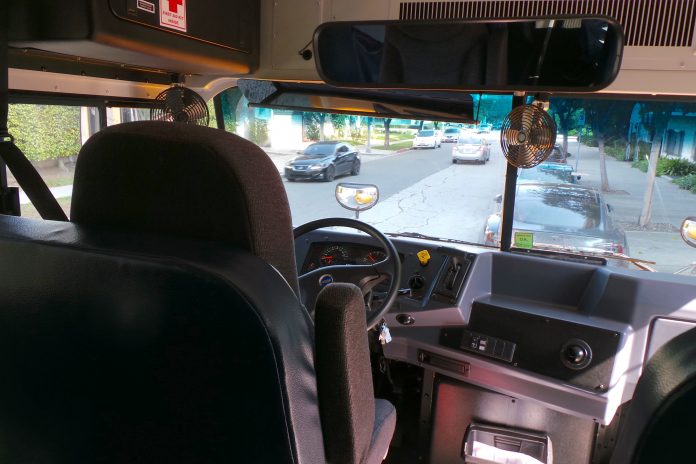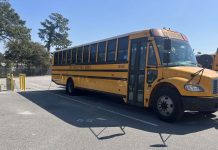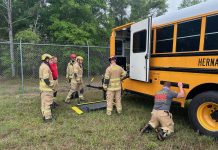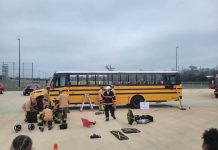For the annual industry meetings last week in Columbus, Ohio, School Transportation News asked some local transportation leaders to share how the school bus driver shortage is affecting their own operations.
Based on their responses, it appears that the shortage being felt nationwide is not currently as severe in the Buckeye State. But challenges remain.
Bruce B. Berry, director of transportation at Black River Local Schools in Sullivan, reports that his district is not currently experiencing a driver shortage. “All routes are covered with regular drivers and we have four regular substitutes to cover absences,” he explained. “In worst-case scenarios, I drive a bus route if no one else is available. So far this school year, I have only had to drive on three occasions.”
Berry said he is optimistic that his expected driver vacancies will be filled soon after this week’s conference concludes. “I currently have a new position for a special needs van driver that will be filled on my return from the conference, and another special needs van driver position that will also be filled due to retirement of a driver,” he shared. “I have internal candidates [substitute drivers] who will be hired to fill those vacancies.”
Sharon L. Conley, who is a transportation supervisor at Northwest Local Schools in McDermott and the south region director of the Ohio Association for Pupil Transportation, said her district is in a good situation with its drivers. “While I would like to have additional substitute bus drivers as a cushion, all of my routes are currently filled,” she added. “However, a couple of drivers calling off certainly pose a challenge.”
While she currently has several drivers in training, Conley said she remains optimistic for the remainder of the current school year and into the 2020-2021 school year.
Elsewhere in Ohio, the story is similar. “We are very fortunate to not have a shortage this year,” said Jay Price, the transportation supervisor at Mohawk Local Schools in Sycamore. “What has helped our district with getting drivers is recruiting current employees from the school.”
The most recent drivers he has trained have children who attend the school and also work there seven hours a day as aides. The morning route and afternoon routes are one hour and 15 minutes long each. “Both drivers were excited after they received their first check,” he said. “Their pay doubled by adding the bus driving pay.”
He added that the hardest part about recruiting new drivers is identifying candidates with the proper temperament to work with students.
While conceding that kids will be kids, Price said his perspective on why schools have so many driver vacancies is a general lack of morals. “No one wants to drive a bus with unruly kids who have no respect for anyone else,” he said. “That is why it’s a parent problem.
“Parents call in all the time wanting to see a video of their child’s incident on the bus and say that [their child] wouldn’t do that,” he continued. “It’s a real eye-opener when they see how their child really acts.”
Beth Cain, the transportation director for Piqua City Schools, said that for the moment she is narrowly avoiding the driver shortage. “We currently have enough staff to cover our current routes. But if anyone gets sick, we are begging subs to come in and drive for us,” she relayed. “Our subs have other jobs and sometimes cannot help. We use my administrative assistant and a custodian to help out more than we should.”
And given the national driver shortage, Cain said she doesn’t see the situation approving in 2020. She suggested that schools have a hard time filling routes for several reasons.
“These jobs are split shift. So it’s hard if you need eight hours a day to find time to do an additional job,” she explained. “Pay has to come up, but it is still low for the amount of responsibility and liability a person has. The behavior of students today is a deterrent. It’s very difficult to drive with kids acting up behind you, hitting and swearing.”
Deb Graber, transportation director at Pettisville Schools near the Michigan border, reported an up-and-down situation this school year. “We have drivers for all our regular routes. But we are definitely short subs,” she said.
Their solution was to run a second route, for example, “after another regular afternoon route this past Friday, after not having a sub for one of our regular routes” And she is also “confident we will not have any new subs prior to Christmas,” so their current situation will continue into the new year.
Given that, Graber said she is hopeful that her district can attract several sub drivers this school year, whether that consists of sharing a neighboring school system, or getting their own. “We have had a couple of subs in the past who we have shared with a neighboring school district, and that has always worked out well,” she reported.
It is Graber’s opinion that the primary reasons for those vacancies are that most people don’t want the responsibility. “Most adults will need a supplemental job for financial reasons. Bus driving is an interruption during the day, so you would need the right job, in order to be able to also drive a bus,” she concluded. “Most employers do not have that flexibility.”
Editor’s Note: This article is reprinted from the Show Reporter.
















